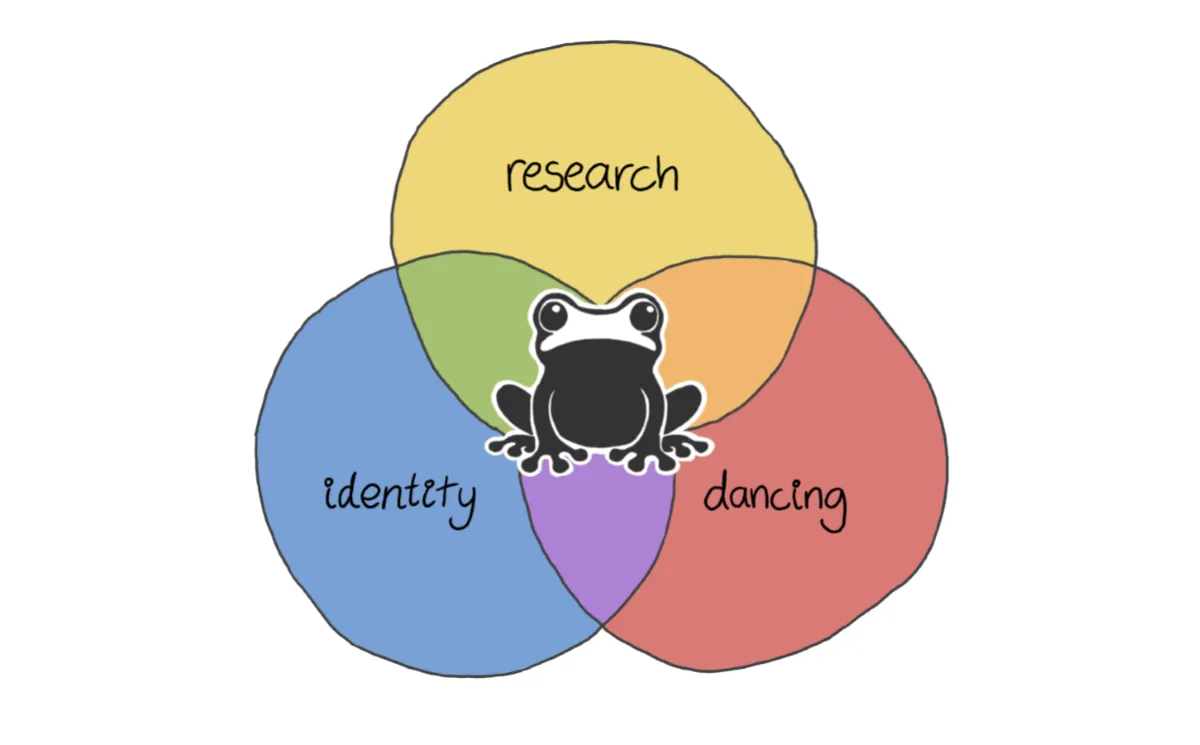
When you Kermit to the bit: why frogs are part of this scientist’s identity now
Michelle Littlefair is a PhD student at the ANU Fenner School of Environment and Society researching frogs in agricultural landscapes. She is also a dancer who uses her performances to spread awareness about global frog declines. We spoke to her about how frogs have become such a large part of her life.
So: frogs.
My life.
Talk me through it from the beginning.
I started my undergrad with a casual interest in frogs, but then I met my honours supervisor who was a super-intense frog person, and she made me into a super-intense frog person too.
And now it’s like frogs have become my whole personality. That’s how everyone knows me. I get frog presents every Christmas and birthday. People will just come up to me like, ‘Hey, I bought you something!’ And it’s frog thing.
It’s just become bigger and bigger and bigger and bigger and it’s taken over every part of my life. There’s my PhD research on frogs, which I love and adore, but I've also been dancing since I was five and somehow the frogs have made their way into that part of my life too.
It’s a lot.
Do you feel like you’re in too deep with the frog thing now? Do you wish everyone would stop buying you frog things?
A bit, but also, I don’t want it to stop. At first, I thought, ‘I don’t want to be that crazy frog person’, but then… This is weird, but do you know who Alex Jones is?
The conspiracy theorist guy?
Yes, exactly. So back in 2015, he went on this big rant about people putting chemicals in the water and how this had turned the frogs gay. And because of that, frogs became queer icons. It’s this whole thing.
Frogs are queer icons?
Yes! Because of Alex Jones, but also I think it's something about them having these different phases of their life, and also being a terrestrial and aquatic animal.
So there’s this whole queer frog thing happening and I really embrace that as part of my identity too.
If there was a Venn diagram of your life, the bit where all the parts overlap would say: frogs.
And I had no intention of it all crossing over but the frogs sort of made their way through! It just made sense to incorporate some of the frog stuff into my dancing because I do burlesque and drag, which has a large queer audience, and that community is already interested in frogs from an icon perspective - and they’re really passionate about the environment.
It started out as a joke, just a silly little frog act, because it’s funny. But then I developed it, and I started including the phases of a frog’s life, and how they're really vulnerable, and then I started putting other people's research into it as well, and sassing the audience into downloading the FrogID app.
After performances, people were coming up to me and saying, ‘I downloaded the app because of you’ or they’d tell me about frog calls they heard. When I performed it at the Queer Night at the Museum, so many people came up to me and said, ‘I do science and I would love to be able to get the message of my research across that way.’ So people were listening, and they cared, and they were interested.

Let’s talk about your research.
I’m part of Sustainable Farms, a team based at the Fenner School of Environment and Society at ANU, and I’m studying what’s happening with frogs in farm dams.
I have been looking at control dams, which are just standard dams you'd find in the middle of paddock, and also what we call enhanced dams. These are dams that have been improved in some way. They’re either fully fenced-off, or they're fenced-off with a hardened access point so the livestock can only access via one little bit, and the rest of it is re-vegged.
And I've been comparing control dams with these enhanced dams and looking at the abundance and occurrence of frogs in each. I visited about 100 dams in the southwest slopes of Victoria and New South Wales, measuring the vegetation, the soil type, the water quality, and then going back at night-time to survey the frogs.
What I’ve found is that, overwhelmingly, there are more frogs at the enhanced dams.

Why would farmers want frogs?
Frogs have really porous skin, and they absorb all the chemicals and all the bad stuff around them in the environment, which is why they die out so easily.
And turn gay.
Exactly. But it also makes them great bioindicators, so by having a frog on your farm, it’s a really good way to tell whether you’ve got good water quality, good air quality, and good vegetation, and that will give you a better outcome for your livestock.
Also, if a farmer has a pest that’s going through their crops, a lot of frogs will go in into the crops, eat the pests, and then come back out of the crops without damaging the farmer’s income at all. Plus, birds love to eat frogs and a lot of farmers are interested in bringing in more birds.
They are?
They really are. I’ve been working with farmers since 2016 and the idea that farmers are just wanting what’s best for the pocket as opposed to what’s best for the overall environment is outright wrong.
I have a great relationship with the farmers, which is lucky because I’m out there driving around their property at 2am! A couple of them have come out to the dams with me, looking for frogs, even taking their kids. They love it. There are farmers who have frog bingo cards, and they’ll come out and be like, ‘So I know I have six species here. Can we listen and find all six species?’
What does a healthy dam look like?
There would be at least five different species of frog, and owls calling, and bats going off. It’s loud! Which is really interesting because you go out onto a farm at night and you expect it to be silent, but it’s almost deafening, which is great.
At some of the enhanced dams, farmers have put in picnic tables, because they go out there for down-time or with their families. It’s tying in with their mental health too. A lot of them have children and they want the next generation to have an environment that will sustain them as well. That’s why I love when the kids come out, because they get excited when they see a frog.

They’re pretty cute.
They’re really cute and funny. And maybe I’m being a crazy frog person, but I think each species has their own personality and I find that I find that really endearing.
And yet I wouldn’t say frogs rank as one of the sexiest animals, and burlesque is quite racy… I’m struggling to imagine how you incorporate frogs into your performance.
It is a challenge! Doing an act that is burlesque and sexy and educational and also a frog is difficult, but somehow I’ve made it work! I literally frog-hop around and apparently that’s everyone’s favourite part of the act. I’m hopping around like a frog in my underwear, and it’s both funny and strangely sexy, because when it comes to burlesque, it’s just not that serious. But first, I start like a tadpole…
A tadpole dancer.
A tad-pole dancer!
You can use that. That’s for free.
Thank you so much! So I start like a tadpole dancer, and originally I made this act for the Adelaide Fringe in a venue which had a pool, but I can do it without a pool. And then, BAM, I grow legs and I’m a frog. I’ve got frog noises coming in, and then all of a sudden it changes to Jump Around by House of Pain, and everyone can get into it and join in, but the whole time I have frog calls in the background.
The message is serious but by making it comedic, the audience is actually interested in wanting to get involved without being made to feel guilty. And people all over Australia love this frog act. I’ve been booked more times than I could have imagined for the frog stuff.

Can you just spell out the connection between frogs and the queer community for me again?
I genuinely don’t think most people in the queer community could explain it to you. It’s like explaining a joke. But I think it’s about identifying with the process of going from a tadpole into your fully-imagined version of yourself.
Do you identify with this froggy journey?
I was raised on a farm and my family is lovely, but I never really felt like I fit in in a small town. Moving to Canberra for my PhD, I found this beautiful, diverse queer community, and have felt so much more freedom, where the frog thing and the queer thing can just all tie together.
Is it important to you that queerness is part of your identity as a scientist?
It’s not about me. It’s about others in the community. I know that there are other queer people out there who love science and want to pursue a career in science, and it would break my heart to know they didn’t follow their dreams because they didn’t believe they fit the mould of what they think a scientist is.



